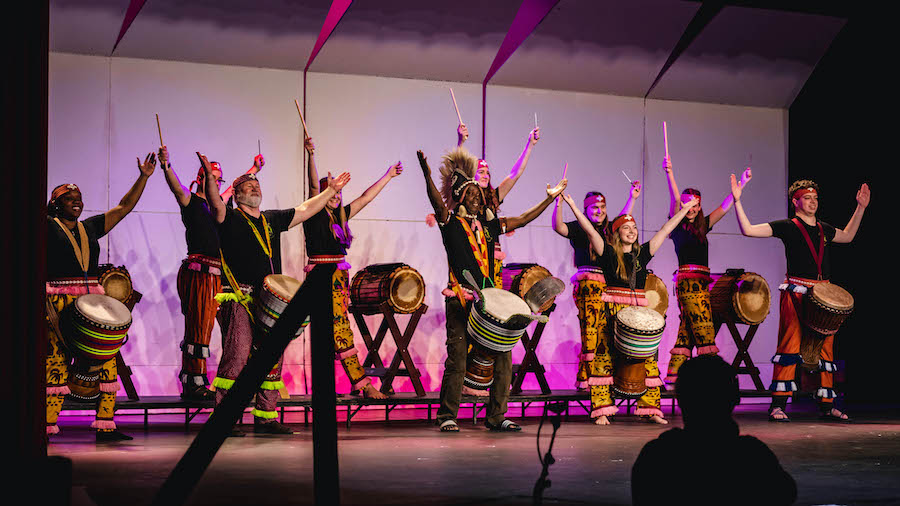Students of the South Carolina School of the Arts at Anderson University are keeping an exciting part of West African culture alive.
For well over a decade, the West African Dance and Drumming Ensemble, directed by Dr. David Perry, music professor and chair of the Department of Music in the South Carolina School of the Arts, has exposed audiences to this wonderful tradition. Perry became fascinated with the West African performance tradition while engaged in doctoral studies.
“During my doctoral work I took a drumming class… We did a drumming and dance class,” Dr. Perry said. “Seeing the dancers interact with the drummers and my master drummer—his mastery of all this—really engaged me and I gained a value for that. I call that ‘getting bit.’”
Anderson’s West African Dance and Drumming Ensemble performances engage the audience’s senses with colorfully dressed performers dancing to the sound and rhythmic energy of authentic African drums.
The West African Dance and Drumming Ensemble has performed for the Dr. Martin Luther King Junior Birthday Service, as well as at campus chapels and events. They’ve also performed at area schools. Outside the Anderson area, the ensemble has performed for the South Carolina Music Educators Association (SCMEA) conference and the National Baptist Worship and Music Conference.
Their fast-paced performances tell stories passed from generation to generation. They celebrate life events—births, weddings, coming-of-age and traditional stories. One example is the story of a young woman unable to have children who was approached by a magic bird offering to give her children if she’d gather 100 cola beans.
Dr. Perry explained, “When these West African countries became independent from the colonists (France, England, Portugal) they wanted to create their own cultural identity. They created these ballets and they went all over the world.” Dr. Perry credits Mammady Keita, an internationally-recognized artist who played an influential role in introducing this art form globally.
Guest artist Alisa Caldwell shares with students at the South Carolina School of the Arts from her many years of experience in West African dance. Caldwell, who has been a part of the opening and closing ceremonies for the 1996 Olympic Games in Atlanta, feels blessed that the students are open and willing to learn about something bigger than themselves.
“Everyone loves to hear a great story. African dance is beautiful nonverbal storytelling,” Caldwell said. “You have the drum and the dance and those two are married; when they come together, there’s a beautiful union and anyone can be part of it.”
The students in the ensemble feel a real sense of community as they rehearse and perform.
“It’s something that you don’t understand until someone has invited you in,” said Mabry Boyle, a junior music education major. “We love it and catch the West African bug.”
“It’s such an immersive and community-based experience all around,” said Olivia (Livvy) Whitlaw, a junior majoring in Elementary Education. Livvy invited Mabry to join the troupe. Hesitant at first to add West African Dance to her already full plate of studies and activities, Mabry finally relented. Looking back on her decision, she has no regrets.
“I just felt like I was supposed to be dancing. I was supposed to be glorifying God through this while I’m here,” Mabry said.
Kenna Boyle, Mabry’s twin sister, is also a music education major and part of the West African Dance and Drumming Ensemble. During the second semester of her freshman year, a friend invited her to watch one of the rehearsals. She tried playing the drums, and within a few minutes was hooked.
“After just that five minutes of experience I had, I was like ‘I want to do this,’” Kenna said. “It’s all one big complex puzzle that somehow fits together. Each drum plays a different rhythm. Every part fits together in some way.”
Tobias Walker, a junior criminal justice major, has danced with the ensemble since he first entered college.
“I really do love the spirit we put into this art form,” he said. “I think it also has a lot to do with me being African American—I get to learn a piece of my culture.” Tobias admires Bolakanda Conde, a world-renowned drummer from Guinea who has also performed with the ensemble as a guest artist. Walker hopes to someday visit West Africa.
Olivia Stepp, a senior vocal performance and pedagogy major, is in her fourth year with the ensemble.
“I grew up dancing, mostly classical ballet, lyrical, contemporary,” she said. “I’ve never done anything like this before.’ As soon as I started I couldn’t stop. It was so much fun.”
“We have this honor of having this gift that we can pass along to other people. I want them to have this wonderful artful experience, but also have this affection, not just for the music but for the people who created this music and create that bridge of humanity,” Dr. Perry said.
The West African Dance and Drumming Ensemble will be performing in Night of Percussion, April 13, 2022, 7:30 p.m. in the Henderson Auditorium of the Rainey Fine Arts Center.

